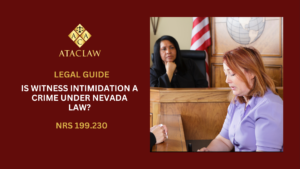Nevada doesn’t take lightly to any degree of witness intimidation. Causing harm to prevent a witness from testifying is categorized as a felony, with potential time in prison, particularly if physical force was used. However, the grim horizon of severe charges or even prison doesn’t remain unchallenged. With the support of an experienced criminal defense attorney, like here at ATAC LAW, it’s possible to have charges mitigated to minor ones or even completely dismissed.

What Does Discouraging or Intimidating a Witness Entail?
In Nevada, when we talk about someone attempting to dissuade or intimidate a witness, it boils down to a couple of fundamental aspects:
Firstly, there’s a need for an intention to disrupt or derail the legal process; and
Secondly, this intention is followed up by actions or behaviors such as using pressure, physical force, threats, scare tactics, or outright deception to:
a. actively stop (or attempt to stop) an individual from showing up at a legal or official proceeding, where they are supposed to testify or provide evidence because they’ve been formally requested or subpoenaed; or
b. convince or somehow persuade an individual to skip out on a legal obligation to appear as a witness or to dodge providing necessary documents or evidence when required.
In simple terms, it’s against the law to deliberately try to convince or force someone not to show up, testify, or submit evidence in any legal matter. Whether or not these attempts actually influence the legal case or proceeding is beside the point. The mere effort to apply pressure or intimidation toward a witness stands as a punishable offense in the eyes of Nevada law.
How Can You Counter Charges Under NRS 199.230?
Because the Nevada Supreme Court hasn’t issued an interpretation of NRS 199.230, this lack of specific guidance may actually be beneficial. It creates room for unique and innovative defense strategies tailored around the specifics of your case. Here are a few potential approaches:
One possible defense is the absence of intent to obstruct justice. If the prosecution cannot conclusively prove, beyond a reasonable doubt, that you were trying to stop the court from hearing a witness or receiving evidence, then the charges may crumble.
Another defense could be that you were falsely accused. Let’s imagine the supposed ‘victim’ was subpoenaed but didn’t wish to testify. To shirk responsibility, they might falsely claim that you intimidated them into not testifying. If a credible and persuasive argument can be built supporting this narrative, the case may be dismissed.
Please note that it isn’t a valid defense to argue that the ‘victim’ would have opted not to testify or submit evidence, with or without your intervention. The case’s outcome doesn’t hold relevance – it’s your actions and your intention to impede justice that’s in focus.
Could Witness Intimidation land you in Jail?
Under Nevada law, the incarceration period for preventing a witness from testifying or submitting evidence varies based on the seriousness of your conduct.
If you haven’t used any physical force or posed an immediate threat of using physical force, violating NRS 199.230 is deemed a gross misdemeanor in Nevada. As a result, you could face:
1. Up to 364 days in a county jail like the Clark County Detention Center, and/or
2. Fines up to $2,000.
However, if you did employ physical force or an immediate threat of physical force, you could be charged with a category D felony in Nevada. This carries:
1. A prison term of 1 to 4 years in a Nevada State Prison, and
2. Fines up to $5,000.
Given the complexity and potential consequences of facing charges under NRS 199.230, it’s crucial to have knowledgeable and robust legal representation. If you’re dealing with this situation, don’t hesitate to reach out for help. Consider calling ATAC LAW for experienced legal advice and defense strategies to navigate through these charges effectively.
For further legal assistance and to discuss your case with an expert, don’t hesitate to contact ATAC LAW.
